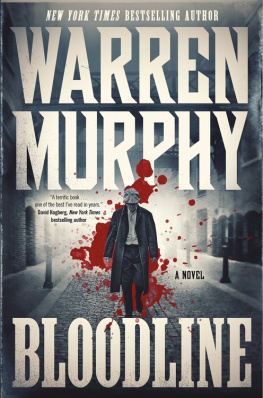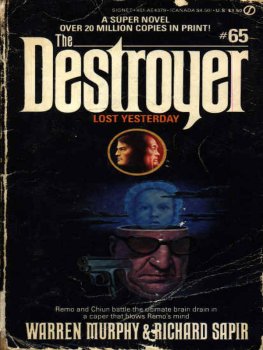DESTROYER #45: SPOILS OF WAR
Warren Murphy
For Margaret Richardson McBride, with love and appreciation, and for the Glorious House of Sinanju, P.O. Box 1454, Secaucus, NJ 07094
One
On the day he pushed the man off the Pontusket Bridge, Artemis Thwill knew he was free. More than free. He was launched. He hadn't expected to kill the man, or even start to push, even though he had often thought such things. He would be standing near a curb watching a woman balance two heavy packages and wonder what it would look like if he threw a body block into her lower spine. Artemis weighed 228 pounds. He was six feet, two inches tall and had played linebacker for Iowa State.
He was a senior vice-president for Inter-Agro-Chem. So Artemis Thwill did not go around throwing blocks into ladies with packages. He went around offering to help carry packages, joining the Congregational Church, and coaching in the Pee Wee League.
But he would see the little boys with their big expensive shoulder pads and their little twigs of neck between the two and imagine himself roaring onto the field yelling, "Let's have some real hitting, you little spoiled-ass bastards!"
Then he would see himself smash a fist into one
of the wobbly helmets on the twig necks and collapse a kid with a satisfying thwump. Then he would take a pair of little ankles with his fingers and use his 67-pound offensive tackle as a swinging club and go through his lineup screaming that this was where he was separating the men from the boys, as he separated a birdlike ten-year-old arm from its shoulder joint.
All this he imagined. He even imagined the parents staring horrified at the crushed bodies lying around the Pee Wee League field. And he would say, "They never would have made real football players. Get this shit off my field."
That was the scene that played in his head as he wrote a lengthy report on how football was physically and emotionally unhealthy for the children, . and formed a parents' league for sane athletics.
He was called on often to talk around the country, and he had a very good speech to do it. He would even choke and sometimes cry when he would tell parents in Duluth or Yonkers, "You take these twigs of necks between those bulky plastic helmets and those shoulder pads, and my God, I can see them snap. What would happenjust imagine what would happenif you slammed your own fist into one of those helmets. It would be like a pinball game."
It was also good business for Inter-Agro-Chem. It made publicity. And since Inter-Agro-Chem had been accused of poisoning more river beds than Hitler did minds, it wanted to appear sensitive to people's needs. Coming out against tackle football for tykes made Inter-Agro-Chem look good. Especially when this was done by one of their senior vice-
presidentsIowa State '60, Harvard Business School '62, Artemis Thwill.
That's what Artemis Thwill had done with his desire to pulverize little necks. At one of his community talks, a man rose who had remembered Artemis Thwill from Pontusket High School. He remembered that Artemis hadn't had a pair of pants without a patch on them until he started playing football. He remembered that no Thwill in Pontusket had ever even owned a house larger than a used mobile home, until Artemis started playing football. He pointed out that Artemis had earned an education through football and enough money playing second string for a professional club to go to graduate school and that without football, Artemis might presently be spreading fertilizer instead of directing people who manufactured it, directing people from a big desk in a big office with a pretty secretary and a traveling expense account of $22,800.
To this man Artemis Thwill answered softly, breathing into his voice the outrage of most of the people whom he knew were on his side. Like most meetings anywhere, people came to hear what they wanted to hear from people who wanted them to believe what they already believed. This was called by various names: consciousness raising, proseletyzing, or telling it like it is. Artemis had the crowd.
"It's true I was poor," said Artemis. And the people, his people, growled slightly, their outrage fueled.
"It's true I didn't have a pair of pants without a patch," said Artemis. "But I ask you, what sort of a system makes young boys hit other boys in order to get an education."
Applause. He knew this crowd thought all the ills
of the world were brought on by this recent civilization, which had in reality made more progress in the last half-century than all mankind did in its first million centuries. The pro football crowd, on the other hand, thought all the ills of the world were brought on by these people.
In other words, everyone was talking cow droppings, and six foot, two inches tall Artemis Thwill, with the blond hair receding just slightly, and the soft blue eyes and massive shoulders and stern chin, knew how to out-drop any Guernsey this side of a Pontusket pasture.
"Maybe if we taught with kindness and enlightenment instead of fear, maybe, just maybe, we wouldn't have people who felt a need to kill other people," Artemis said softly, with full knowledge that his nation's streets had become unsafe in direct proportion to all the understanding and kindness forced on its police departments.
That was what Artemis had said. What he imagined doing was punching the man in the penis with a 228-pound uppercut. He imagined saying, "You're right. I am white trash and this is how I settle things."
That was what Artemis wanted to do.
But not until Artemis threw the man off the bridge did he ever do what he wanted to do.
That day was March and bitter, and the fields were wet with melted ice and snow and the rivers beginning to gorge. The man was watching the ice break and flow.
"Don't jump," yelled Artemis, running from his car.
"Don't jump," yelled Artemis, pushing the man up the railing.
"Don't jump," yelled Artemis, smashing the man's clinging hands until they let go.
"Oh, my God, help," yelled the man.
"Crazy fool," yelled Artemis. "You had so much to live for."
The man hit ice below like a garbage bag full of gravel. You could hear the head crack solid against the ice floe, and then the body went splash and the man went flowing downriver, wedged beneath the ice.
Only for a moment did Artemis Thwill regret what he had done. This was not a high enough bridge to be absolutely sure the man was dead. Next time it would have to be a certain death. For Artemis Thwill knew, even before the man hit the water, that he would do this again.
Thwill knew what made him such a good football player back in college. He liked to hurt. But most of all, he discovered on this chill delicious March day, he loved to kill.
There was of course an investigation. Artemis told the police he really didn't want too much recognition for trying to save the man's life. He thought it might disturb an already disturbed widow. "If only we had more psychiatric counseling," said Artemis Thwill.
"The wife says he didn't commit suicide," said the Pontusket chief of police, who did not believe in psychiatric counseling, and felt himself a hypocrite for not announcing that the police department ought only to protect people from other people, not people from themselves.
"Poor thing," said Artemis.
"She says he always went to that bridge to walk," said the chief.
"Poor thing," said Artemis.
"She says she thinks you threw him over, Mr. Thwill."
"Poof thing," said Artemis.
"Did you?"
"Of course," said Artemis with the chill cutting edge of one of the town leaders to one of the town servants.
"Sorry, I had to ask, Mr. Thwill."
"That's all right," said Artemis, with deep understanding in his voice. Artemis knew understanding properly used could be more insulting and humiliating than spit in the face. "Perhaps I ought to speak to the woman."
Next page



